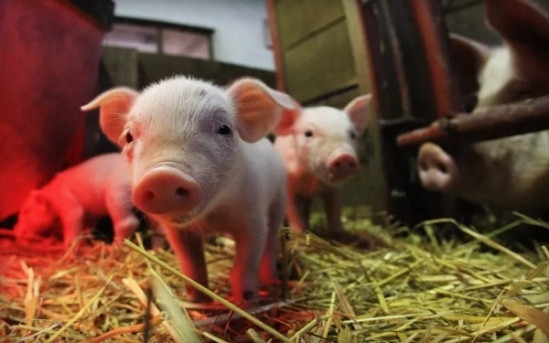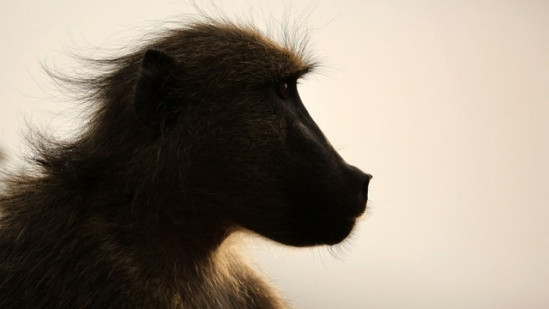Pig hearts will be transplanted into... humans?
Scientists have made important strides in research on transplanting animal organs (pigs) into the human body.
A baboon has survived for more than two years with two hearts inside its body: one of its own and the other from a genetically modified pig. The discovery, published in the journal Nature Communications, is an important step towards using pig organs to replace diseased human organs, scientists say.
 |
This success has contributed to genetic engineering as well as a combination of anti-rejection drugs. Scientists at the US National Institutes of Health have kept pig hearts alive in the bodies of five baboons for an average of 298 days. First, people transplanted the pig hearts into the circulatory system inside the baboons' abdomens and then used drugs to prevent the baboons from rejecting the hearts. The pigs in this experiment were genetically modified to match the biological structure of the human body. Up to now, people have been able to prolong the maximum life of the experimental animals for 945 days.
Scientists say they will use improved drugs to completely replace the baboon's heart with a genetically modified pig's heart in the coming years. If successful, scientists will move on to the most important stage of the research: transplanting a pig heart into a human body. This could be a future solution to the shortage of donated human organs for transplant surgery.
According to statistics, about 8,000 people die each year while waiting for organ transplants. Due to the high demand for organs in transplant surgery, scientists have long wanted to use animal organs as replacements, a technique they call "xenotransplant". However, previous transplant attempts have been unsuccessful. In the 1960s, many patients died after receiving organs from baboons and chimpanzees because their bodies could not adapt to these new organs. To solve this problem, scientists turned to research using organs from pigs that have been genetically modified to be compatible with humans (pigs become ideal candidates for animal-to-human organ transplants due to their size, short growth cycle, and widely studied DNA). In 2002, work began when two biotechnology companies announced that they had produced pigs whose organs were not immediately rejected when placed in humans.
But even with genetic modification, the baboons’ immune systems eventually rejected the pig organs, a conundrum for those hoping xenotransplants will solve the problem of organ shortages in surgery.
 |
| The baboon lived for more than two years thanks to a pig heart. |
In the study, scientists used organs from a genetically modified pig breed to prevent rejection and blood clotting during transplants. They sewed pig hearts into the abdomens of five baboons, leaving the baboons' hearts in their original positions. The researchers did this to give them time to perfect anti-rejection drugs for transplants of non-allogeneic organs. After the transplants, the baboons were regularly injected with anti-rejection drugs similar to those used in humans.
Initially, the animals fared well after the transplants, but about five months later they died from infections that developed resistance to the antibiotics. Because the animals were otherwise healthy, the scientists began to wonder whether the pig hearts could survive a year without the antibodies. "The hearts could have lasted longer, but we wanted to test some drugs that would help the transplanted organs tolerate the host, so we had some early deaths," said study co-author Muhammad Mohiuddin, a transplant surgeon at the National Heart, Lung, and Blood Institute.
Scientists eventually realized that the survival of the transplanted hearts depended on the drugs, and when they stopped injecting the antibodies, the baboons began to reject the new organs. So they removed the pig organs, returned the baboons to their original state, and the four animals that survived at the end of the experiment.
Peter Cowan, director of the immunology research centre at St Vincent’s Hospital in Melbourne, who was also involved in the study, said the transplanted hearts survived for two years and possibly longer if the baboons were given the right drugs. He said this was an important step before clinical trials of pig heart transplants in humans.
The results of the study are very promising, but many scientists still have many doubts. They say it will be very difficult to find the right combination of drugs and genetic modifications to prevent rejection from the human body. Moreover, transplanting animal parts into humans can expose us to dangerous viruses from animals.
But Arthur Caplan, a biologist at New York University, believes the issues people are objecting to will be resolved over time: "We have new gene editing techniques that allow us to focus on the immune rejection problem, and we will be able to do that." In addition, scientists can kill the pig virus through genetic engineering or vaccines. Cowan said that none of the surviving animals were infected with the strange virus from the pig, which is a good sign.
The next step for the research is to find a way to completely replace the baboon’s heart with a pig’s heart and keep it alive – something that has not been successful in the past. The team is also finalizing the genetic modification of the pigs to make them more suitable for the upcoming trials.
In any case, this is a positive sign for the surgical industry in the face of the current serious shortage of organs for transplant.
According to tintuc.vn
| RELATED NEWS |
|---|
